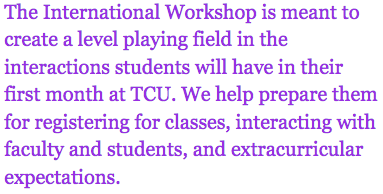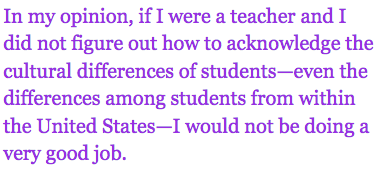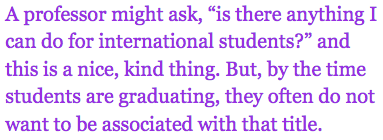John Singelton works in the International Services office, which provides support for international undergraduate and graduate students as well as international faculty, visiting faculty, and the families of these various groups. We discussed the experiences of international students arriving at TCU for the first time, the need to learn about and adapt to different cultural lenses, and what the “international student” moniker means.
For more about International Services, visit their website.
When international students arrive on campus, they have learned to succeed academically in two or more languages and test in a second culture and language. These are also students who have jumped off the bridge of cultural support in their native country to study at TCU. Unlike domestic students, they have left their country, family, and friends. So while international students may be extremely prepared academically, what trips these students up is the cultural structure of writing and the cultural piece.
—John Singleton
What types of support does the International Services office provide?
Because we work with the spouses and families of undergraduate and graduate students as well as faculty and visiting faculty, we call ourselves “International Services,” rather than “International Student Services,” which is a more common name for departments like ours. Our first area of contact is through immigration support. We provide documents and help with the visa interview. Once individuals arrive, we provide the first programming they will receive: the International Workshop, which provides students with information about the cultural experience of studying in the U.S. We also provide a language assessment through the Intensive English Program [see interview with Dr. Kurk Gayle].
Then, we do student programming that calls on our international students’ experiences in their home countries. This allows our students to give us a perspective of who they are and their identity. Based on that information, we create programs for our U.S. students to engage with our international students. For instance, we showed a film about global hip hop a few nights ago. We are extremely conscientious about our work. We look at every benchmark university that is doing good global work and see how our program compares.
Finally, we are a support network for students in emergency situations, such as a car accident. These are “drop-all services,” where we can justify stopping everything to help students in dire situations.
How does the International Workshop help students transition to the academic culture of TCU?
The International Workshop is meant to create a level playing field in the interactions students will have in their first month at TCU. We help prepare them for registering for classes, interacting with faculty and students, and extracurricular expectations. All of these have cultural components. Everything we do reflects back on the cultural component of these matters. So, we do not cover the same material as the general  orientation, which international students also attend, but look at the cultural component of anything from being in a U.S. classroom to going to a bar after class with U.S. students.
orientation, which international students also attend, but look at the cultural component of anything from being in a U.S. classroom to going to a bar after class with U.S. students.
We also work with partners across TCU, such as the Center for Writing [see interview with Dr. Steve Sherwood] or the Counseling and Mental Health Center, to provide sessions specifically designed for international students. We hope our partners are willing to tailor their general orientation presentation to focus on the cultural components of their work. Some departments are more open to this. Other departments are open to working with international students, but what they mean is that they will be nice, not that they will adjust their presentations.
What are the typical academic challenges faced by international students students?
When international students arrive on campus, they have learned to succeed academically in two or more languages and test in a second culture and language. These are also students who have jumped off the bridge of cultural support in their native country to study at TCU. Unlike domestic students, they have left their country, family, and friends. So while international students may be extremely prepared academically, what trips these students up is the cultural structure of writing and the cultural piece.
For writing, students are generally taught to write paragraphs of content in their home countries, rather than arguments. Argument styles are very different as well. In Latin culture, writers are expected to give the relevant information, but also a variation of it too, such as anecdotes or even a form of prose. Citing systems are less formal and students are sometimes tripped up by the succinctness and structure of American writing systems.
There are also cultural differences in the way students operate in classrooms. For instance, most international students would never show up to a class drinking coffee in their pajamas, because that is perceived as disrespectful. Another difference is our culture of individualism. Class participation brings a punishment in many countries and students are certainly not encouraged to argue or disagree with instructors. These behaviors are encouraged and expected here, which causes dissonance. Group participation can be particularly tricky for students from Asian countries, because of the cultural difference. Relationships with faculty are very different as well, because, in many countries, teachers do not generally  meet with students individually. In general, once students get through the cultural gap, international students will succeed and excel academically.
meet with students individually. In general, once students get through the cultural gap, international students will succeed and excel academically.
As writing instructors, how mindful do we need to be about differences among or between international student groups?
In my opinion, if I were a teacher and I did not figure out how to acknowledge the cultural differences of students—even the differences among students from within the United States—I would not be doing a very good job. Others might disagree and say that language is static and that single form connects us all. I am on the other side of the spectrum on this issue. Cultures have different ways of producing knowledge. That is to say, there is a cultural component to every nation’s cognitive lens. What instructors should strive for are ways to recognize these differences. If you can find ways to do that, the better you are able to tap into a student’s experience and the more adaptable you are to their needs. The beauty of writing is that you are on that cultural side and you can adapt.
What are some things you think that composition instructors need to know about working with international students?
Aside from what I have already suggested, a deeper understanding of the cultural differences in writing practices. Knowing the lens through which people write in their different cultures is useful and is something I think you can get at. Considering the differences between “national essays” in different countries would be a start. There are national exams across the globe, and you could determine national writing expectations by studying these. Then, you could compare that with the basic SAT essay. When our students go abroad, they are held to different national standards as well. So, understanding the cultural norms of writing could help both international and domestic students.
In your opinion, what do the students you serve want composition teachers to know?
Here we get to the crux of a big thing. The “international student” moniker is to international students what “frat boy” means to male students and what “sorority girl” means to female students. Students in fraternities and sororities could be very proud of that, but know that the terms come with a lot of secret, potentially negative, baggage. International students know that there is secret baggage with being called “international.”  Often, here at TCU, this is a secret, positive baggage. We have plenty of departments that call me asking for international students to join their courses. Being an international student can mean being a more serious student, being a more dedicated student. Not always, but often. On the other hand, international students also know that the moniker “international student” often means people believe you are not up to the level of American students. A professor might ask, “is there anything I can do for international students?” and this is a nice, kind thing. But, by the time students are graduating, they often do not want to be associated with that title.
Often, here at TCU, this is a secret, positive baggage. We have plenty of departments that call me asking for international students to join their courses. Being an international student can mean being a more serious student, being a more dedicated student. Not always, but often. On the other hand, international students also know that the moniker “international student” often means people believe you are not up to the level of American students. A professor might ask, “is there anything I can do for international students?” and this is a nice, kind thing. But, by the time students are graduating, they often do not want to be associated with that title.
